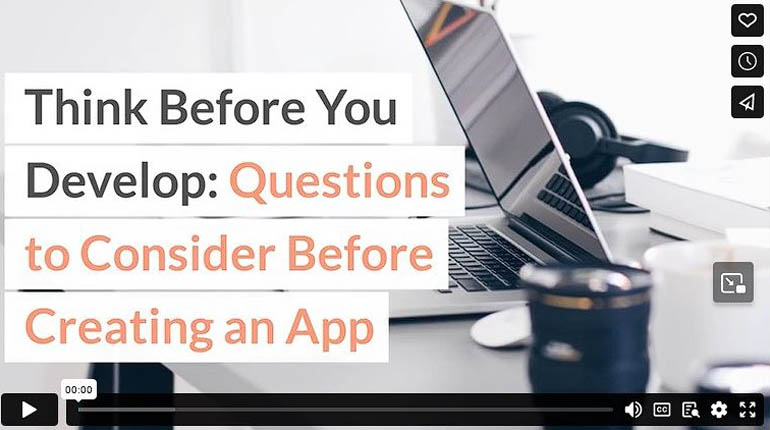There’s nothing quite like the high of developing a new app. It’s a time when your whole world is full of possibilities: what can be done, how you can change the game, and how much of an impact you can have on others (and yourself, of course).
But it’s incredibly easy to get ahead of yourself.
Many app creators launch head-first into the app development process without stopping to consider important questions and plan for future bends in the road.
While some have success with “winging it,” many fail.
And neither of us wants that for you.
That’s why I’ve put together a list of the top questions that you should consider BEFORE you ever start developing your app. These questions are critical first steps for putting together your development roadmap and creating a winning development and launch strategy.
So before you dive into development, take some time to do the preliminary brainstorming and planning. You’ll thank yourself later.
Here are the top considerations to start working through ASAP.
Will creating an app be profitable for your business?
Think about the full pipeline, from a customer’s first touch with your app to how you’re making revenue. Is there a direct link?
Can a customer make a purchase directly through your app, or is it more of a support tool to build relationships and nurture them toward a purchase? If it’s the latter, what are all the steps (and the timeline) between using the app and becoming a paying customer?
It’s sad to watch an entrepreneur or company invest tons of resources into an app that never generates any revenue or profit. Avoid the money pit.
Who are your competitors?
You’ve probably heard this many times, but it can’t be overstated: Competitor research is a critical part of building any new business. You simply must know what you’re up against and how your offering will add unique value.
Ask yourself: why would customers choose me over my competitors? What’s my unique selling point (USP)?
Dig even deeper: use your competitors’ apps and study their marketing materials. What’s working and what isn’t? How can you build off their successes and avoid their failures?
Does your app have a market?
You can have the most functional, beautiful, ground-breaking app in the world. But it doesn’t mean anything if nobody wants to use it.
Taking competitive research a step further, do some market research. What are the types of tools on the market right now for solving the same problem that you’re trying to solve? (More about that in the next question.) How successful are those tools? How are you contributing something different to the mix?
If there’s no established market, you have the fun task of creating one. This will have a whole new set of implications for your communications and marketing department, so make sure to get them involved early.
How does your app solve a problem?
The most successful startup apps solve a specific, laser-focused problem for their audience. Once you know what problem your app solves, consider how people are already solving that problem right now.
It might be a series of other tools and steps jumbled together, or there may be a tool on the market that already does the job well enough (which ties back into your competitor and market research from earlier questions).
When you know exactly what problem you’re helping your audience solve, you’re in a better position to “reverse engineer” the app itself to ensure you’re solving that problem in the most intuitive, appealing, and engaging way.
Who will use your app?
You should know your target audience inside and out, including both demographic and psychographic details.
Demographic details include basic info like their age, gender, occupation, income, and location. Psychographic details explore their personality—things like their beliefs, values, interests, and lifestyle.
The more you understand about your target audience, coupled with other research on the competitor and market, the more knowledge you have to make strategic, effective business decisions.
Do you have enough time for designing, testing, and building?
We all want our new app to be on the market as soon as possible. After all, time is money.
But do yourself a favor: don’t rush the process. A rushing scenario sets the stage for all sorts of red flags, like taking shortcuts, overlooking critical pieces, and putting out a first version that frankly sucks.
Create a realistic timeline for every step of the process, and don’t skip the important parts like testing and QA. Touch base with your development team to get their honest opinions on timeframes.
Do you have enough money for the post-launch journey?
Building the first version is one consideration, but what money is left for marketing? What money is planned for feature development once you have customer requests?
Many people only calculate the money it takes to build the first version. They assume it will work without a hitch and that the money will start flowing in.
But the truth is, that’s just the start of the journey.
Don’t burn all your resources on the initial round of development. This is just one part of a bigger, longer process.
Should you build it in-house or hire an app development company?
If you already have a team of experts, building in-house can be a great option. Alternatively, in-house can also be a good option if you don’t have an in-house team yet, but you’re willing to make a long-term investment to build one.
If neither of these applies, you might want to consider hiring an app developer or team of developers. A web app development company can ensure that you’re getting the biggest bang for your buck, giving you access to a well-rounded team of experts who are dedicated to getting the job done right (the first time).
Be thoughtful and strategic with your new app.
While it’s a magical feeling to be inspired by a game-changing app idea, too many entrepreneurs are blindsided by the joyride. They fail to consider the checkpoints that ensure they’ll succeed in the long run.
Don’t fall victim to this mistake.
While your app idea may be amazing, there are lots of other moving parts to consider before you take the plunge. Stop and think about the questions we’ve discussed here. Get more opinions: have some brainstorming and planning sessions with business partners, advisors, and other trusted people.
When you develop thoughtfully and strategically, it makes all the difference for your outcome.
Infographic
This infographic outlines essential pre-development steps for an app’s solid roadmap and triumphant launch. Assess profitability by linking customer interaction to revenue. Conduct competitor and market research, and understand your audience thoroughly. Avoid rushing the process, allocate resources wisely, and plan for the post-launch journey. Consider in-house development or hiring a dedicated app development team for optimal results. Be thoughtful and strategic in bringing your game-changing app idea to life.

Video





